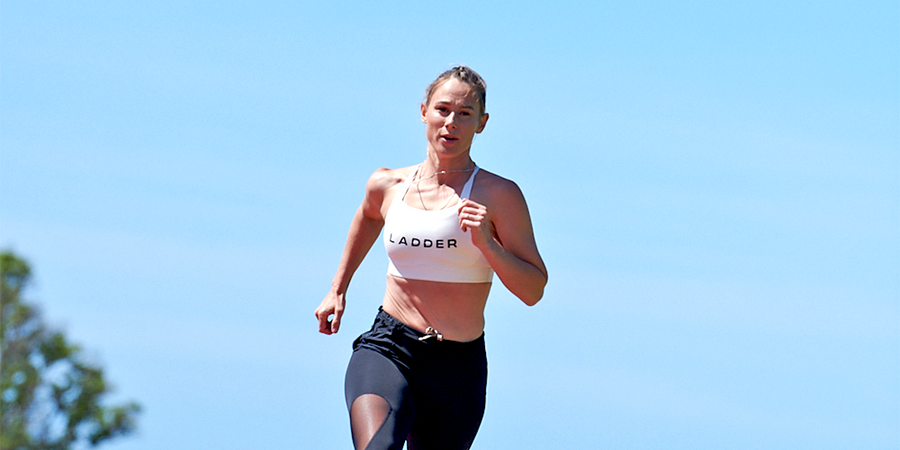
Here's What Happens to Your Body During a Marathon
By Jenessa Connor
Curious about what happens throughout a marathon? While it looks as simple as putting one foot in front of the other for 26.2 consecutive miles, the journey of the human body (and mind) is a bit more complicated. To get a behind-the-scenes look, we asked Bec Wilcock, ultramarathoner and LADDER athlete, to walk us through the whole experience. Here's what she had to say.
Help fight fatigue, replace electrolytes, rapidly rehydrate with LADDER Hydration.
.
Part 1: The Adrenaline Rush

You may have been up since 5 a.m. You may have waited for a port-a-potty for 20 minutes, and you may have had to walk nearly a mile to get to the starting line. But, no matter what happened that morning, you will feel a surge of energy as you approach the start line.
“You're excited. You're nervous. Your body is already under stress, and some of that stress is actually good stress because it produces that adrenaline rush," says Wilcock. “You've been training for a long time, and today's the day. As that gun goes off, whether it's your first marathon or you've run many marathons, you still get that butterfly feeling in your stomach."
Harness those fight-or-flight hormones, and you'll be off to a strong start. Just keep an eye on your watch and be mindful of pacing. “I think 80% of people start their race too fast, especially if they're a beginner," Wilcock says. “That adrenaline kind of pushes them to run just a tad over what they're meant to be running."
.
Part 2: The Reality Check
Around 45 minutes to an hour into the marathon, the adrenaline rush begins to fade, and glycogen stores dip. “When that adrenaline wears off, the body then goes into like, 'Okay, what do we need to do? How fast are we going?'" Wilcock says.
This is when most runners take stock of their current pace and how they're feeling. The reality of just how much work lies ahead comes into focus, and runners tend to adjust their pace accordingly.
This might also be a good time to check for discomfort in any part of your body. Jogger's nipple and runner's toenail are common minor injuries that can quickly turn from annoying to unbearable. If you feel the onset of either of these problems, it might help to change your shirt and tighten your shoes.
.
Part 3: The Wall

Hitting the metaphorical “wall" tends to happen about 90 minutes into the race when the body's glycogen stores are completely drained:
- Your pace slows
- Fatigue sets in
As it becomes harder to put one foot in front of the other, your mental fortitude may start to waver, too. You may doubt your ability to make it to the finish line. Or wonder why you bothered to register for a marathon in the first place.
However, it's possible to avoid (or at least postpone) hitting the wall with proper hydration and fueling. “I like to tell my athletes to have something (to eat) at the start line, so you are stocked up on your carbohydrates, and then you wanna have something at that hour point," Wilcock says.
“If you don't do this by the 90-minute mark, you're going to start to slow down because you're switching over into your fat stores (for energy)," she cautions.
Your personal preference and plenty of pre-race testing should determine what you eat. Some runners like energy gels and chews, while others stick with traditional snacks like granola bars or bananas. Sipping water or an electrolyte drink, like LADDER Hydration, at every mile marker will help you keep your fluids up.
.
Part 4: Cruise Control
If you're fueling and hydrating correctly, you can feel relatively strong and steady up until around miles 18 to 20. “The marathon always hurts no matter how fit you are, but you don't have the high highs and the low lows if you keep your body stable by upping your carbohydrates frequently," Wilcock says.
She points to the pros, many of whom consume carbs and fluids every 30 minutes. However, how frequently you need to eat and drink depends on your unique physiology.
“Every human is different. You think about how I sweat in comparison to how you sweat, so your hydration and your water and electrolyte intake might be different than mine. Male to female is different. Low hormonal phase to high hormonal phase is different for women. It takes a lot of factors," Wilcock says.
Another important variable? Your brain.
“In a marathon, you have a lot of time to think. I always like to say to my athletes that your motivation comes internally. So that internal chat needs to be positive in order for you to have a positive race," Wilcock says.
When you're tired and still eight miles away from the finish line, it's easy for something like a chafing hemline, runny nose, or slower-than-goal pace to lead to a mental spiral.
Instead, Wilcock likes to focus on the solution and forward movement. Do you need to stop and adjust your clothes? Eat more? Take in more fluids? Do what you need to do and carry on.
.
Part 5: The Wall Returns

You can do everything right in terms of training, mental preparation, fueling, and hydration, but around mile 20, you'll likely feel pretty depleted. “It requires a lot of energy to move your body mass and propel forward," Wilcock says.
“Your body heats up, so thermo-regulation starts to kick in, and your heart has to work a little bit harder because you're slightly dehydrated. Therefore, if your heart is working harder, it's harder to get blood flowing to your muscles. The body and the organs are starting to be under stress and slow down a little bit." As a result, you may experience cramping, nausea, and muscle pain.
There's also the mental hurdle of having come so far — yet still having so far to go. Those last six miles can feel like the longest ones of your life. So again, positive self-talk is a must. “The body is all connected, the stomach, the heart, and the brain," Wilcock says. "So that means that the mind is connected to everything that's going on in the body, within the body. So if you have a bad thought, you will become that thought."
.
Part 6: The Final Push
Those few final miles of a marathon often come with a welcome energy boost. Maybe the sugar from your last fueling hits, or you slowed your pace a bit, allowing your body to cool down. But most runners will tell you that the final push is almost entirely mental.
“The finish line is getting closer, so the body starts to get a second wind and go again," Wilcock says. As you near the end, the sideline cheering tends to intensify, and you realize that you will finish one way or another.
.
Finale: Victory

There's no better feeling than seeing the finish line come into focus after pounding the pavement for over 26 grueling miles. It's a combination of relief, elation, and pride (but mostly relief). You can finally stop running.
But don't stop moving, says Wilcock. Once you pose for a victorious finish line photo and hit the food and hydration table, keep walking to promote blood circulation and help prevent swelling.
Then, once you settle down for an afternoon of rest and recovery, try to get up and move every 30 minutes to keep your muscles from tightening up. Stretching your muscles, along with replacing fluids, can even help reverse what research has found to be a short-term decrease in height that's caused by long-distance running.
You may also want to load up on some immune-boosting foods post-marathon: Some research suggests that running a marathon may compromise your immune system due to increased stress hormones, body temperature changes, and dehydration.



